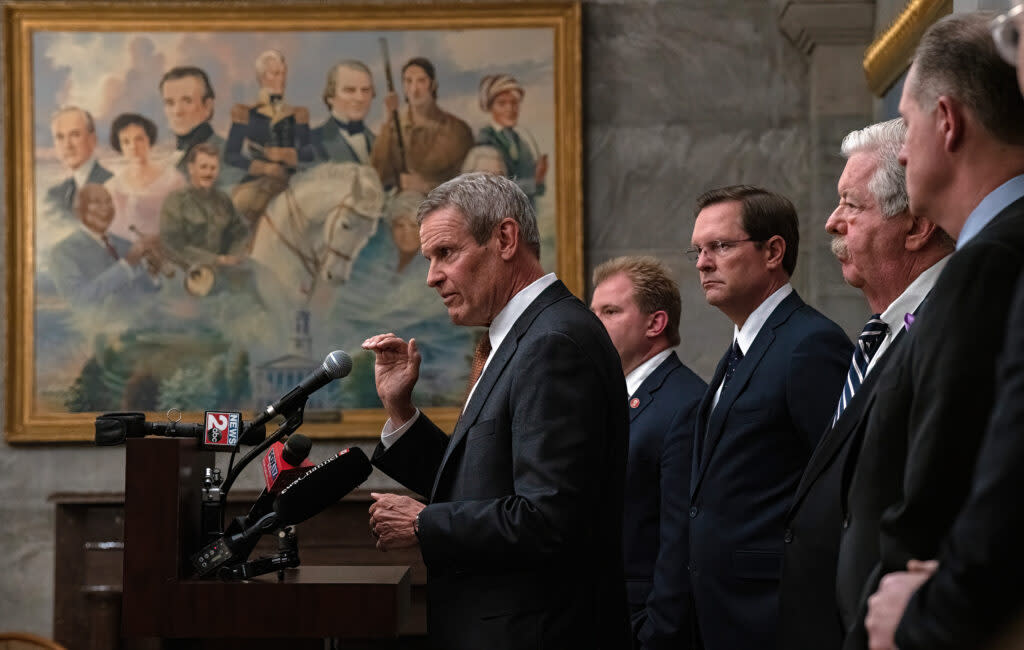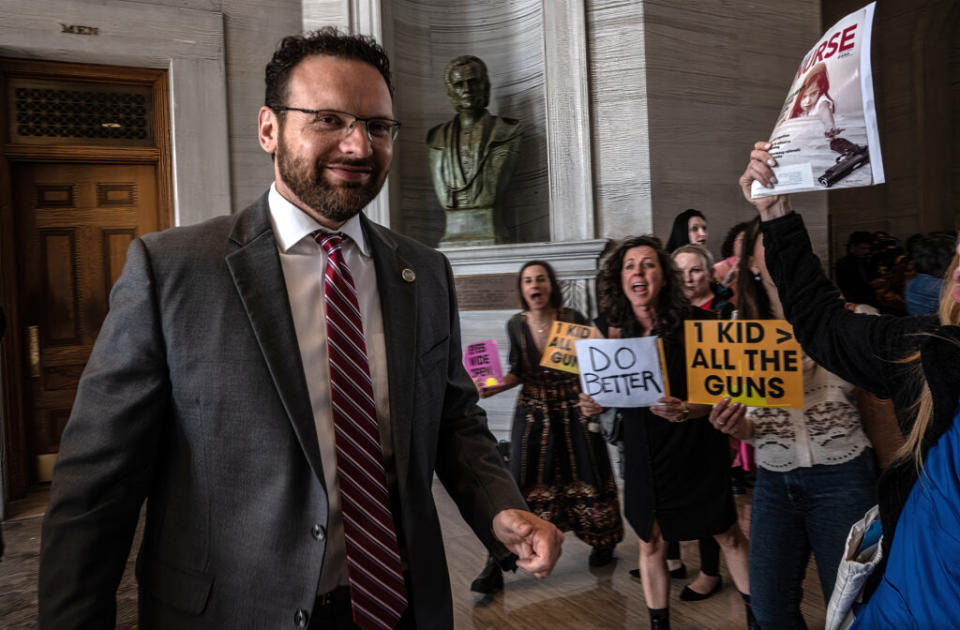Stockard on the Stump: Gov stumbles to end of Tennessee session

- Oops!Something went wrong.Please try again later.
- Oops!Something went wrong.Please try again later.
- Oops!Something went wrong.Please try again later.
Gov. Bill Lee is pictured here with Republican legislative leaders but continues to strike out on big legislative initiatives. (Photo: John Partipilo)
Gov. Bill Lee entered the fray as a “political outsider” six years ago. Based on his performance toward the end of the 113th General Assembly, he’s still standing on the other side of the fence — almost invisible.
The Legislature ignored his pleas to pass a private-school voucher bill for every student in the state, and Volkswagen workers in Chattanooga balked at his opposition to the United Auto Workers vote by opting to unionize by 3-to-1.
That made him 0-for-2 heading into the final week of the Legislature’s Nashville occupation when he managed to squeak out at least a partial victory as lawmakers reached an agreement for passing the administration’s $1.9 billion franchise tax break. What a legacy: a massive tax break for Lee Co., the HVAC and plumbing giant.
Lee’s folks started pushing repeal of the property tax portion of the franchise and excise tax this year after more than 80 companies challenged it. The claim was that it caused “significant legal risk,” although nobody has seen a lawsuit, leaving many lawmakers perplexed about giving away a big chunk of state revenue, most of which will go back to out-of-staters.
Gov. Bill Lee’s legacy may be not education reform but a $1.9 billion tax break for businesses, that the Lee Co. — the HVAC and plumbing giant his family founded — could benefit from.
Lee, whose connection to the Lee Co. was placed in a blind trust (with plantation shutters?) at the start of his administration, lobbied against House efforts to put tax dodgers’ names and rebate amounts on the state’s website. He called it “unprecedented.”
But following a Last Supper gathering in the Senate meeting room Thursday morning, lawmakers approved a three-year $1.55 billion rebate, repeal of the property tax provision that will cost $400 million annually in perpetuity, a “transparency” deal to name the companies seeking rebates and a “range” showing how much they’ll get back.
The upper range is $10,000 and above, “laughable” as one onlooker said, meaning the biggest companies’ CEOs would have to decide whether they want to list their business on the Department of Revenue site or, for example, take a $5 million kickback, excuse me, I mean rebate.
While Republicans argued that the state had “erroneously” taken the money from businesses, Democrats countered that “there is nothing fiscally conservative about a $1.7 billion handout.”
Democratic Rep. Bo Mitchell of Nashville contended, “The House does not roll over the Senate and bow down to the Senate.”
Well, maybe it does.
And, yes, Virginia, corporations are people, too. You know all that refund money will go straight into workers’ pockets.
(It must be noted here that Democratic Rep. Johnny Shaw of Bolivar voted for the franchise tax deal while Republican Reps. Gino Bulso of Brentwood and Jody Barrett of Dickson voted no.)
In the case of Lee Co., it’s unclear how much it could get back, though its 2022 revenue was reported at $340 million. But since Lee has nothing to do with the company’s operations while he’s in office, he could be immune from criticism for pushing a massive tax break that benefits the HVAC and plumbing company. I’d hate to be the CEO who doesn’t file for the break.
Lee wanted to be known as an education reformer, if that means doling out millions to private schools.
Instead, two years from now, he’ll be landing with a golden parachute while the state’s unwashed masses beg for a grocery tax break that’ll net them a few bucks a month.
Since we’re talking about batting averages, we won’t give Lee credit for 1-for-3, because batting .300 will put you in the Hall of Fame. No, we’ll give him half a hit and let him hit about .250 with warning track power, not quite legendary status, but at least good enough for lame duck standing.
House Minority Leader Karen Camper gestures as Rep. Justin Jones, D-Nashville, at left, exchanges words with House Majority Leader William Lamberth, not pictured. (Photo: John Partipilo)
The 113th General Assembly ends.
House Speaker Cameron Sexton kicks back on Wednesday, April 24. (Photo: John Partipilo)
Rep. Ryan Williams, R-Cookeville, sponsor of a bill to arm teachers, reads a report from the safety commission at Marjorie Stoneman Douglas High School in Florida, site of a 2018 mass shooting. (Photo: John Partipilo)
Rep. John Ray Clemmons expresses relief as the House passes a motion to 'sine die': to end the legislative session. (Photo: John Partipilo)
Amid a House vote that will allow teachers to carry concealed firearms in public school, lawmakers enjoyed catered Chik-fil-A lunches. (Photo: John Partipilo)
House Minority Leader Karen Camper gestures as Rep. Justin Jones, D-Nashville, at left, exchanges words with House Majority Leader William Lamberth, not pictured. (Photo: John Partipilo)
The Reynolds effect
Speaking of losses, Gov. Lee’s decision to stand behind Education Commissioner Lizzette Reynolds, despite her shortcomings, is proving to be yet another horrible move.
On the one hand, Attorney General Jonathan Skrmetti opined this week that the education commissioner has to be “qualified to teach in the school of the highest standing of which the commissioner has authority,” as required by state law. The Tennessee Journal first reported the opinion.
But then he went through a lengthy effort to explain how teacher certification isn’t the same thing as being qualified to teach, pulling from a 100-year-old law and practices by local school districts.
Reynolds and Lee apparently thought she needed to get up to snuff or she wouldn’t have enrolled in a teaching course at UT-Martin and signed for a tuition waiver – possibly committing perjury, since she hadn’t been a Tennessee resident for six months, as required.
A Rube Goldberg maze of words: In a legal opinion about Education Commissioner Lizette Reynolds’s fitness for office, Attorney General Jonathan Skrmetti wrote the the commissioner must be “qualified to teach,” but not necessarily certified to teach.
Based on nearly a century of changes in requirements for county schools superintendents and the general need for “literary and scientific attainments,” Skrmetti found that “the General Assembly chose to grant the Governor unchecked authority to appoint the Commissioner of Education.”
Of course, Skrmetti also said the General Assembly doesn’t have standing to file a lawsuit if it wants to remove the education commissioner.
Critics say she moved here from Texas to carry the governor’s private-voucher bill to passage. If that’s the case, she failed miserably because the bill never could gain traction, and some wonder how long it will take for her to move back to the Lone Star State.
Skrmetti also said in his opinion he would be the only one who could sue to remove the commissioner.
Democratic Rep. Caleb Hemmer of Nashville responded that the attorney general’s opinion is unclear and raises more questions because it says the act “clearly states they have to have a teacher license,” but then says they “likely” don’t need the license.
“Regardless, Commissioner Reynolds has shown through her actions, words and lack of general understanding of Tennessee education policy she is not qualified to be in the role.”
Democratic Rep. John Ray Clemmons of Nashville accused Skrmetti of “tap dancing” around the language in the 100-year-old law “in an attempt to protect the governor’s clearly unqualified appointee who is being paid over $255,000 per year.” Clemmons contends the opinion “confirms” Reynolds is unqualified.
Whether unqualified or not certified to teach, whatever term you choose, and still registered to vote in Texas at the start of the year, Reynolds is hanging in by the skin of her teeth. The governor’s office sends out the same tired response each time reporters check on her status: She’s the greatest thing since sliced bread.
But while she couldn’t answer most questions lawmakers had about vouchers this session, she at least told the truth about one thing: Test scores for students in the “education savings account” program were “nothing to write home about.”
And one more thing: If some other prospective teacher lied on a tuition waiver form, they would probably face prosecution, instead of being given the excuse of an “administrative error.”
Yet another failure
Gov. Lee floated the idea for an extreme risk protection order law last year in the wake of the Covenant School shooting but couldn’t persuade lawmakers to adopt it. He refused to bring it up in a special session on public safety.
Not only did lawmakers refuse to consider the plan in 2023, they voted this session to prevent local governments and the federal government from passing “red flag” laws to allow police from confiscating the guns of people deemed a risk to themselves and others.
Democratic Rep. Justin J. Pearson argued that instead of preempting local governments “that might have a modicum of courage,” the House should be enacting gun laws to protect people.
Republican Rep. Barrett of Dickson, though, said he swore an oath to uphold the Second Amendment and later pointed out, if left to their own devices, local governments would adopt different laws and leave people uncertain about the rules each time they crossed a county line.
They then put another nail in the coffin of so-called “local control.”
Genesis of child rape bill
Aaron Gulbransen, a lobbyist with the Faith & Freedom Coalition and a former writer with the conservative Tennessee Star, brought the legislation this year that will allow child rape offenders to be given the death penalty.
Both houses passed the measure amid quite a bit of grumbling. Nobody wants to be seen as coddling child rapists, but several Democrats contended that execution is not a deterrent and that putting child rape convicts on death row will force victims to relive the trauma for decades.
Predictably, House Majority Leader William Lamberth clashed with Democratic Rep. Aftyn Behn during floor debate this week, reading from testimonies of people purportedly supporting the death penalty for child rapists.
As usual, the Republican-controlled chamber passed the measure with ease. Who wants to go home and face an election challenger who could say you like child rapists?
Gulbransen, who apparently made the shift from reporter to lobbyist with ease, acknowledged the plan is to bring a case to the U.S. Supreme Court that will overturn settled law, which allows the death penalty only for first-degree.
“In our quest to fight child and human trafficking and defend children, as an organization we were exploring with various members of the General Assembly for about a year how to add penalties to these offenses, whether it’s child rape and obviously there is a trafficking component because if you’re facilitating the rape of a child, I could see there being application there.
I hope the DAs, when they get their discretion, will consider that,” Gulbransen said.
Lamberth took the lead, and the rest is history.
Expect to hear more on this in a couple of years because even though it’s unconstitutional now, this Supreme Court full of Donald Trump appointees could turn it back.
Just as the justices allowed states to ban abortion, they could let states kill more people for a heinous crime, even when the state’s system for execution is on hold because people don’t know how to mix the chemicals properly.
Flag bill dies
The bill designed to stop Pride rainbow flags from being flown in schools – championed by Rep. Bulso and Sen. Joey Hensley, both supporters of cousinly love – died in the Senate this week when Lt. Gov. Randy McNally voted against it in a 13-6 outcome that sent the bill packing. It was a rare loss for a Republican bill in the Senate.
A measure by Rep. Gino Bulso, R-Brentwood, to ban LGBTQ Pride flags from schools, failed. (Photo: John Partipilo)
McNally, an Oak Ridge Republican, said it had constitutional problems two months ago and stuck with his first intuition.
The comment made for strange partners. McNally also said he was “tired” of paying the ACLU, the same thing Behn noted when she argued against a bill prohibiting people other than parents or guardians to take children out of state for transgender or abortion treatment, which are now illegal in Tennessee. (Sorry, but I might be confusing my culture war bills here.)
Either way, we’ve been led to believe the state has a new underground railroad for teens seeking abortions and transgender treatment, and we need a new law even though kidnapping is illegal already.
Last-minute shenanigans
The House and Senate were caught up Thursday in a move to make transporting a minor out of state for transgender treatment a felony.
The bill sponsored by Republican Rep. Bryan Richey of Maryville passed the House initially without the felony charge. But then lawmakers tried to re-establish a felony with a deal that would allow it to be voted on without going through finance committees.
Eventually, the felony charge was removed, according to Richey, but a civil action could be taken against anyone accused of taking a child out of state. The amended bill also removes a provision saying a medical diagnosis is not a form of “recruitment.”
Another clash
Reps. Justin Jones and Pearson are accustomed to being silenced for breaking House rules.
But Behn found herself on the wrong side of the law this week when she accused Rep. Jason Zachary of laughing when she spoke against his bill to stop children from being transported out of state for abortions.
“It’s not funny. And every time you’ve presented this bill you’ve been smug, and I don’t appreciate it,” Behn said.
Another Republican immediately accused her of disparaging Zachary.
Does this man look smug to you? After Rep. Aftyn Behn, D-Nashville, called Knoxville Republican Jason Zachary, pictured here, GOP lawmakers accused her of disparaging him. (Photo: John Partipilo)
What? We thought that was a compliment for Zachary, a Knoxville Republican who said he called Gov. Lee’s office and asked him to intervene in a purported case of transporting a minor out of state for abortion care.
Ultimately, Zachary apologized to Behn (maybe), saying he laughed because the ever-present Lamberth offered him a drink of water from a cup he’d used.
The attempt at humor is not lost on those who live with a BS meter.
And it came after Democratic leaders asked the parliamentary question: Can it be a violation of House Rule 19 if it’s fact?
They silenced Behn temporarily, nevertheless. But if looks could kill, Zachary would be another zombie.
“In your head, in your head, they are fighting.” *
(“Zombie,” The Cranberries)
GET THE MORNING HEADLINES DELIVERED TO YOUR INBOX
The post Stockard on the Stump: Gov stumbles to end of Tennessee session appeared first on Tennessee Lookout.



